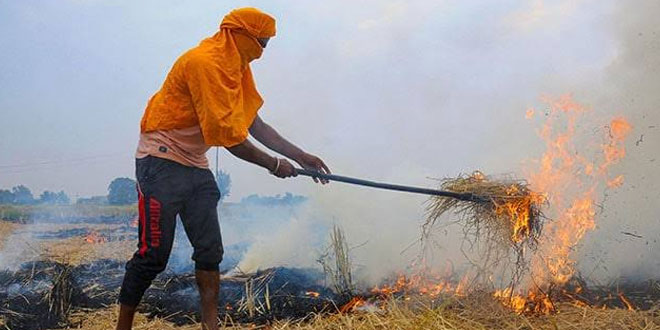Highlights
- Crop waste burning is a major source of air pollution during winter
- Rice farmers can hire machines to dispose of the paddy straw: Govt
- The farm fires in North India could pick up in the next few weeks
NEW DELHI: India is likely to reduce crop waste burning, a major source of air pollution during the winter months, by 75-80 per centin Punjab and Haryana states, part of the country’s farm belt that borders the capital New Delhi, two government officials said on Tuesday. Every winter, a thick blanket of smog settles over northern India, as a combination of factors such as the burning of crop residues, industrial emissions and vehicle exhaust brings a sharp spike in pollution.
Crop residue burning accounts for about a quarter of air pollution in winter months, various studies show.
The federal government and the state governments of Punjab and Haryana have ensured that rice farmers can easily hire machines to dispose of the paddy stalks and straw, said the officials, who did not wish to be identified in line with government policy.
In 2018, Prime Minister Narendra Modi’s government earmarked $177.61 million for two years to give farmers the subsidy to buy farm equipment, such as mulching and seed drilling machines, that dispose of crop waste without burning them.
For the current 2020-21 fiscal year, the government allocated $746.06 million in farm equipment subsidies.
The subsidy programme is in its third year, and it’s going to result in a substantial reduction of up to 75-80% this year, said one of the officials.
The farm fires could pick up in the next few weeks and hit highs in late October and early November, when farmers harvest the rice crop and prepare the ground for winter planting.
So far this year, New Delhi has experienced the longest spell of clean air on record.
Rice harvests will start gathering momentum in the next 30 days, and that’s the time when these claims about substantially bringing down crop fires will be put to the test, said Vimlendu Jha, an environmental expert who founded the activist group Swechha.
(Except for the headline, this story has not been edited by NDTV staff and is published from a syndicated feed.)
NDTV – Dettol Banega Swasth India campaign is an extension of the five-year-old Banega Swachh India initiative helmed by Campaign Ambassador Amitabh Bachchan. It aims to spread awareness about critical health issues facing the country. In wake of the current COVID-19 pandemic, the need for WASH (Water, Sanitation and Hygiene) is reaffirmed as handwashing is one of the ways to prevent Coronavirus infection and other diseases. The campaign highlights the importance of nutrition and healthcare for women and children to prevent maternal and child mortality, fight malnutrition, stunting, wasting, anaemia and disease prevention through vaccines. Importance of programmes like Public Distribution System (PDS), Mid-day Meal Scheme, POSHAN Abhiyan and the role of Aganwadis and ASHA workers are also covered. Only a Swachh or clean India where toilets are used and open defecation free (ODF) status achieved as part of the Swachh Bharat Abhiyan launched by Prime Minister Narendra Modi in 2014, can eradicate diseases like diahorrea and become a Swasth or healthy India. The campaign will continue to cover issues like air pollution, waste management, plastic ban, manual scavenging and sanitation workers and menstrual hygiene.
[corona_data_new]






























